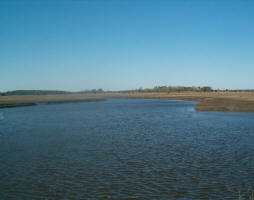 The Cairo Message: Coping with climate change is managing water for life
The Cairo Message: Coping with climate change is managing water for life
A strong and fair agreement in Copenhagen at the fifteenth Conference of Parties (COP‐15) of the United Nations Framework Convention on Climate Change (UNFCCC) on measures to mitigate and adapt to climate change is crucial for water resources, water services, peace and for life.
In recent years and months several global and regional conferences on water have addressed the challenges that climate change and increased climate variability pose to water management. These changes present an additional pressure in the Mediterranean region, which surpasses and aggravates the already existing serious water scarcity and drought problems. These circumstances request further elaboration and urgent implementation of mitigation and adaptation measures applying prevention and precautionary principles in order to address increasing uncertainties.
The following messages are conveyed to the negotiators for the COP‐15 from the Joint Egyptian‐Dutch Water Conference “Towards the new Long Term Strategy for Water in the Mediterranean” held in Cairo, Egypt on 2 and 3 November, 2009. The messages express the understanding and the commitment of the participants of the Joint Egyptian Dutch Water Conference on the actions to be taken at all levels and functions of governance in the region.
Adapting to increasing climate variability and change through better water management and water services requires significant additional efforts within water management and the areas of spatial planning and energy management guided by the following principles.
1. Governance of water resources management and water services should be strengthened within the water box as well as beyond the water box by addressing the water‐energy, and water and food nexus and other complex cross‐cutting aspects. Appropriate operational plans, projects and robust institutions should be in place to effectively manage future challenges and risks at local, national and regional level;
2. Knowledge, monitoring and information on climate and water as well as on adaptation measures should be produced and shared, enhanced data collection and monitoring systems set up and improved access to information and technology transfer guaranteed;
3. Resilience and defense measures to increased climate variability and climate change should be enhanced through the application of holistic concepts that conciliate structural measures with natural ecosystems under appropriate risk management. Particular emphasis should be given to water efficiency throughout the water supply and water use. A high priority should be given first to improve and rationalize current surface and groundwater resources management. Current demand management measures should be seconded by the mobilization of water supply measures (traditional measures such as retention reservoirs, hill lakes as well as non‐conventional options as re‐use of properly treated waste water, desalination, rainwater harvesting, capture of sub‐marine freshwater), once the projected impact of water saving measures prove insufficient. Other necessary multi‐annual regulatory and supply methods and infrastructures in order to address the needs of human societies and ecosystems should be taken into account.
4. Impact and vulnerability assessments, based on appropriate monitoring, including to identify “hot spots” and risk management approaches are critical to sound adaptation practice.
5. Additional and accessible funds are essential as well as coordinated, transparent and effective financing mechanisms in particular for vulnerable countries and communities in the Mediterranean. Leveraging of additional sources of funds beyond grants should be sought, the appropriate blending of loans and grants and effective targeting of grant resources should be encouraged. These fund(s) should be defined in relation to the estimated overall public finance needs for mitigation and adaptation in these countries. Fast‐start financing will be required pre‐2013, in particular to enable capacity building and early actions.
With a sense of urgency these principles need to be adhered to in local, national and regional plans and investment portfolios in the region.
The participants of the Joint Egyptian‐Dutch Water Conference “Towards the new Long Term Strategy for Water in the Mediterranean” express their commitment to strengthen institutional cooperation at all levels among the climate and water, and wider development communities, and commit themselves to develop appropriate mechanism and institutional arrangements in order to work more collectively to address the immense development challenges ahead.
We, gathered at our meeting in Cairo on the 2nd and the 3rd November 2009, urge the COP‐15 negotiators, as well as the national and regional water and climate communities, to look beyond the COP‐15 and work through dialogue on strengthening global and local mechanisms and practices to enhance collective and local action on water and adaptation.
| Contact information | n/a |
|---|---|
| News type | Inbrief |
| File link |
http://www.ufm-water.net/meetings/towards-new-long-term-strategy-water/Cairo_message_version_final.pdf |
| Source of information | The Joint Egyptian‐Dutch Water Conference, 2-3 November 2009, Cairo |
| Keyword(s) | climate change |
| Subject(s) | METHTODOLOGY - STATISTICS - DECISION AID , POLICY-WATER POLICY AND WATER MANAGEMENT , RISKS AND CLIMATOLOGY |
| Relation | http://www.ufm-water.net/ |
| Geographical coverage | Egypt |
| News date | 11/11/2009 |
| Working language(s) | ENGLISH |
 you are not logged in
you are not logged in





